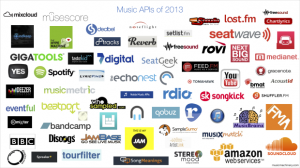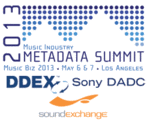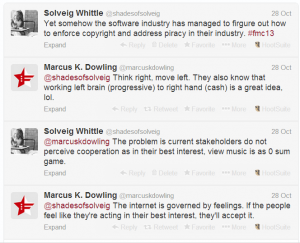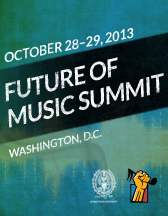I’ve participated, either in person or online, in several music industry events in the past two years. The speakers and panelists have opined on the sorry state of the industry and the plight of independent muscians, and have pointed a forest of fingers:
- It’s the labels’ fault
- Technology (Napster) killed the music industry
- Music piracy is the problem
- Now that everyone can buy ProTools and become a musician, there’s just too much free [not always good] music
- It’s just too hard to find good music, so making music discovery easier for consumers is the answer
- Streaming is the future of music distribution, and Spotify and Pandora don’t pay artists enough
- It’s the fault of radio for being corrupt and paying artists even less
- Apple killed the music industry by unbundling the single from the album via iTunes
- YouTube killed the music industry by elevating sensationalism over quality of music (and artists don’t make much money from it)
- Archaic copyright laws are to blame
- Fans don’t really want variety and quality of music, they are content with Psy and Justin Bieber
- The only way musicians can make money now is by aligning with big brands
- And let’s not forget: Google is evil
It’s all true, to varying degrees, and many people with a lot more experience and knowledge about the business than me are working on addressing these issues.
Yet progress seems slow.
Not a day goes by that I do not read somewhere that being a musician today is both a liberating yet increasingly confusing, disheartening, and economically untenable profession.
In a perfect world, the Direct-To-Fan model eliminates the gatekeepers and creates a music meritocracy, where good music rises to the top and those artists are financially rewarded. Yet that has not happened.
Some would say it always has been so for the 99%, change is good, and this is a brave new world of opportunity for those musicians who can navigate it. Yet we musicians seem an increasingly desperate bunch. It’s not a question of talent or hard work or who you know. Some feel that it is different now, that music is a more irrational business than it has ever been.
Music Metadata
Maybe it’s because I’m an outsider, or naive, but it seems obvious that the solution to a problem created by technology is, yes, a technical solution. Bear with me for a minute.
“Maintaining accurate and standardized metadata isn’t necessarily the first thing that springs to mind when one thinks about the top issues currently facing the music industry, but it is one of the most critically important,” said Bill Wilson, Vice President of Digital Strategy & Business Development at NARM/digitalmusic.org. “If we want people to consume more music, we need to make it as simple as possible for them to find and discover what they want, and ensure accounting is accurate and expedient. Establishing and maintaining a proper information infrastructure is the only way to do that at scale.”

Whether for the benefit of the consumer, the industry or of the musician, I agree with Mr. Wilson, who outlined metadata’s importance for musicians further in a comprehensive, if ponderous, Hypebot article earlier this year.
With the standardization of music metadata (that appendage to an MP3 music file that identifies the author of a song, the genre, and other information), would come greater transparency. Transparency would allow the frictionless (or more nearly frictionless) discovery of music. More importantly for musicians, metadata would make the proper attribution and tracking of music files much easier.
Metadata can be tracked today, but it is messy. Metadata is added to files in unstandard formats, which means it’s very hard to make sense of it. With standardized metadata flowing in standardizd ways through the various software programs responsible for creation, distribution and consumption, musicians would be able to track it and gather data on who is listening to their songs, and where and when. It would be much easier and faster to seamlessly compensate musicians for the consumption of their intellectual property. Of course, this would also perhaps eventually eliminate or at least reduce a layer of middlepeople who currently stand between artists and their fans, collecting money.
But let’s talk first about the most recent efforts to bring people together to work toward solutions to the problems faced by the music industry.
There were two similar events this week which concerned, or should have concerned those in the business of trying to be profesional musicians, especially independent musicians. Unfortunately, both of these events seemed to revisit what seems the common wisdom in the musical illuminati – that technology has disempowered musicians more than it has benefitted them. Neither discussed music metadata.
Future of Music Coalition 2013
Artist manager Peter Jenner [said]… “I’ve been destroying artists’ careers or 45 years,” he said. “Most have been unsuccessful and gone on to other careers.” The reality, he said, is that “most artists are just more of the same” and aren’t innnovative or creative enough to break through. Though he advocated a musicians union to push for more equitable pay, he questioned the need for yet more coalitions beyond ones that already exist. “How many organizations do we need that say the same thing: For God’s sake, pay us.”
The first was the annual Future of Music Coalition Summit 2013 (#FMC13). The first day was a rehash of mostly the same political heat touting copyright reform as the savior of the music industry. The second day showcased inspiring examples of social justice projects using music and film to promote political empowerment and change – which I am in favor of, but which doesn’t really advance the economic and political situation for the vast majority of musicians. David Lowry did not seem to be in attendance.
FMC also talked about its recent health insurance survey which documents something most of us musicians already know – healthcare in the US is a big problem for musicians. Twice as many musicians don’t have health insurance as compared to the general population. Compared this the european health insurance card here, you will find that European artists are creatively covered! If all the FMC did was organize a health insurance pool for musicians, they would have done a great service to the music industry.
One of the speakers also announced what I call “YACC” or “Yet Another Creators Coalition,” a group really called the Content Creators Coalition. One problem with this approach, and perhaps the approach of FMC in general, is that the theory of organizing musicians is good, but in practice it is very difficult. Musicians are individualists with competing interests. Much like organizing farm workers, it would require a charmismatic leader with passion and persistence. Even then, it would take years of focus and sacrifice.
I sat in on the first day of the FMC summit via Twitter. A good summary of the Summit was written by Greg Kot in the Chicago Tribune, which provided the Peter Jenner quote above. FMC has been working hard on two key initiatives, which dominated their summit both last year and this year
- organize musicians
- pursue regulatory changes and copyright law modernization
While I applaud those efforts, the subject of music metadata was missing from the conversation, and technology often seems vilified as the problem rather than the solution to the music industry woes in these sessions.
Virgin Disruptors
Then throw in Will.I.Am, who may soon be as much of a digital/tech entrepreneur as he is an artist and producer. Add Trevor Skeet, aka Yung Skeeter, a DJ, producer and director who’s also part of Spotify’s artist relations team. And just to spice up the brew, add Ian Hogarth of live-music startup Songkick, Nic Jones, SVP international from music videos service Vevo, and Justin Bieber’s manager Scooter Braun.
The second event took place in the UK, but was also streamed online, and has been comprehensively chronicled by Music Ally (quoted above). Organized by Virgin as the first in a “planned series debates on digital disruption”, the Virgin Disruptors “Has Tech Killed The Music Industry” (#virgindisruptors) event included appearances via Google+ Hangout by Amanda Palmer and Zoe Keating, as well as participation by respected musician and tech geek Imogen Heap. From the summary, this event also seems to have been a general airing of grumblings and grievances, albeit by some of the more informed, intellectual and tech-savvy musicians I know of.
The Virgin event seemed more focused on the voices of music industry insiders than the FMC (which was heavy on social justice activists this year as well as the usual academics and policy wonks). The voice of the musician was represented by successful independent artists working hard to make a fulltime living (as opposed to film makers or activists). They are trying to keep creative music alive in an industry that seems to want to thwart them technically and economically at every turn.
Music metadata was not addressed at this conference, either.
Music Industry Metadata Summit
 Another important summit happened in May, 2013, and this one was focused squarely on standardizing music metadata. Part of Music Biz Summit 2013, organized by the Music Business Association (formery NARM and DigitalMusic.org), this was a one day event called the Music Industry Metadata Summit. From the published agenda, it seems to have been a true effort to get many of the major stakeholder who can actually make this happen in the room: Sony Music, Spotify, SoundExchange, BMI, EMI, Rovi, Microsoft, The Recording Academy, The Orchard and many others.
Another important summit happened in May, 2013, and this one was focused squarely on standardizing music metadata. Part of Music Biz Summit 2013, organized by the Music Business Association (formery NARM and DigitalMusic.org), this was a one day event called the Music Industry Metadata Summit. From the published agenda, it seems to have been a true effort to get many of the major stakeholder who can actually make this happen in the room: Sony Music, Spotify, SoundExchange, BMI, EMI, Rovi, Microsoft, The Recording Academy, The Orchard and many others.

I was not there, however, and there was no hashtag to follow on Twiter. I could not find any reports in the music press about what happened at this summit, although there is a brief summary here by Thad McIlroy. Robby Towns of DigitalMusic.org and NESTA also outlined some ways in which his organization is working to expand the usefulness of metadata for extending music content to include things like liner notes in a Hypebot article from September 2013.
The only criticism I have is that there were no musicians on the agenda for this summit, it seemed primarily industry executives and technologists.
I’m excited to see what this organization comes up with, since it appears to me that it is working with the right stakeholders on what I think is the heart of the solution.
Developing Standards Is Key To Healthy Industries
I was a software product manager in my former life, a life that funded my more recent eccentric desire to quit business and pursue the apparently financially unrewarding and socially baffling aim of becoming a fulltime musician. I started my career as a programmer, but part of my job eventually became working with very smart people who sat on standards committees and defined protocols for communication between various electronic devices (computers, phone switches, computer terminals).
I have also worked to market software to the computer programmer, or developer, market – I started my career at Microsoft in 1992 as a Visual Basic Product Manager. I worked closely with our Developer Evangelist Group, which was a huge part of Microsoft’s success expanding from the consumer to business market. Although I am no longer a programmer or Product Manager, I know what a database is. I know what an API (Application Programming Interface) is for. I saw how important having a set of standard APIs was for the success of Windows. Without standard, public APIs, there would be no Microsoft. Developers need things called Software Development Kits (SDKs) that allow them to write their own software so it can talk to other software. SDKs describe APIs so developers know how and what kinds of data to pass between different software programs, whether it’s names, credit card numbers, order information, dates and times – any kind of information. Without standardized APIs, we couldn’t buy things online or do any of the micraculous things we do today with our phones and computers. Nothing would work together.
 It’s not easy to develop standards – there are always stakeholders with divergent economic interests. It can be done, however, if and when the key players realize the alternative to standardization is that no one gets paid because nothing works with anything else. Often it takes the 500 lb gorilla (an AT&T, or a Microsoft – or perhaps in this case Google or Apple) who has the resources to devote to develop and review these standards. They also need the economic and political will and leverage to push these standards forward.
It’s not easy to develop standards – there are always stakeholders with divergent economic interests. It can be done, however, if and when the key players realize the alternative to standardization is that no one gets paid because nothing works with anything else. Often it takes the 500 lb gorilla (an AT&T, or a Microsoft – or perhaps in this case Google or Apple) who has the resources to devote to develop and review these standards. They also need the economic and political will and leverage to push these standards forward.
In the end, the industry (telecommunications, software, and music) and consumers are better off when there are technical standards in place.
I just worry that in the music industry, everyone is watching the house burn down and no one wants to be the first one to grab a bucket.
Music Metadata Standardization
There are three main for-profit, commercial metadata databases in the music industry, Echonest, Gracenote database and the Rovi database. A good overview of these three companies can be found in this article by Ontwayne Hill on JusGoMob1l3. It’s interesting to me that as a content producer, I have uploaded my music to Gracenote (because their CDDB database is what iTunes uses), Rovi (because that’s the only database the Academy recognizes for membership), but not Echonest. All three of these databases have public APIs and CDKs available for developers.
What I still don’t understand is
- why there are three different databases
- why it’s still hard for artists to get paid (quickly) if these databases do actually have data on all the music that’s out there
I also stumbled on a music metadata standardization project this week, TGIT, which grew out of the masters thesis of Jean-Robert Bisaillon (@iconoclaste), a graduate student at the University of Quebec and also an administrator of SOCAN, the Canadian performing rights organization. If I understand it correctly, this is a non-profit project to catalogue all the music metadata APIs, figure out how to translate between them, and to work toward a giant global music metadata database [see comment below by Mr. Bisaillon].
Another older project I discovered was called MusicBrainz.org, a non-profit group dedicated to creating a giant global database of music metadata. Key people were blogger and journalist Cory Doctorow and academic and political activist Lawrence Lessig. Lessig has since turned his attention from copyright reform to the reform of the general political system in America. The MusicBrainz project does not seem to be active beyond 2011, the date of its last Annual Report. [apparently MusicBrainz is still active, although their website has not been updated.]
The Tools Of Creation
Metadata cannot be attached to .wav files, only Mp3s, but it is usually encoded on a CD during the mastering process. Right now, MP3 meta data is edited and attached to music files in three ways (courtesy of this primer on MP3s from About.com):
What I am still puzzled about is why no one is working to embed software in ProTools and Logic to facitilate the addition of metadata during the creation process. One should be able to set certain default parameters (like the composer, producer and track musicians’ names), and enter data such as music genre, have date and time automatically entered in a file when the file is rendered from the project to a single audio file for listening.
Summary
My critique of one of the FMC speakers was that I was not seeing a call to action in her talk – just another litany of woes and simplistic suggestions. I don’t want to make the same mistake in this post.
Instead of more summits about music marketing and DIY promotion techniques for indie artists, I’d like to see an effort to identify and bring together the key business and technical players in the industry. The Music Biz Music Metadata Summit seems like a good start, but there were not a lot of artists represented at that summit.
Or let’s hold a hack-a-thon weekend to develop a software solution to standardize music metadata, instead of holding more for developing additional music discovery apps.
One thing I am sure of, the solution will be built by developers, not politicians.
What do you think of the issue of music metadata? Are you an artist? Music business person? Developer? Share your persecptive on the problem of standardizing music metadata. Please feel free to correct anything in my article, I don’t claim to be an expert, just an interested musician, marketer and technologist.





2 comments
Hi Solveig, your article is a great down to earth mashup of several questions one might ask on music metadata. FMC actually held a panel on the subject but it didn’t get very deep into it. Thanks for mentioning TGiT. Actually the project is building a desktop software to address the specifics of metadata for artists and rights holders. Its like a music tagger with a more focused goal. It will be released as a beta 1.0 this month. You should know that MusicBrainz still exists and is a fantastic service working very hard on the questions you raise. They are also working with ISNI another very active instance. Metadata may very well cure a lot of the creative industry pain switching to the digital realm. But its not only technical. Its very human. Humans take time to act and metadata is not sexy. But as I always say, money and sex are usually part of the same equation. I bet you we’ll have more chances to talk about it. In the meantime I have a Scoop.it (http://www.scoop.it/t/metadonnees-musicales-un-enjeu-de-diversite-culturelle) and I tweet using #musicmetadata
Thank you for your comment, Jean-Robert! I am glad to hear more about both your TGIT project and that MusicBrainz is still in existence. I am also glad to hear FMC had a panel discussion on metatdata – I somehow missed that. I agree that the process is very definitely human – I guess that’s the part that seems like such a black box to me. The humans (artists and others) who are raising the issues of slowness, opaqueness and complexity in the artist compensation process (BMI, ASCAP, SESAC, streaming, radio, royalites, etc.) don’t seem to have any knowledge that anyone is working to rationalize the underlying technology to make the flow of data more transparent. I’d love to see organizations like TGIT and MusicBrainz represented are more industry conferences and hear them talk about what they are doing – in layman’s terms so we musicians can understand. Thanks again for commenting.